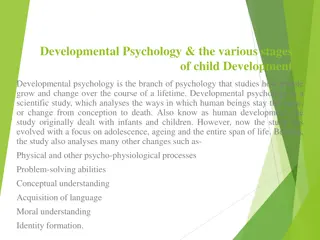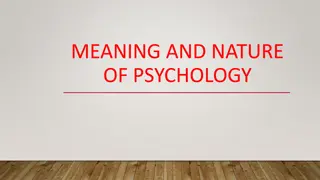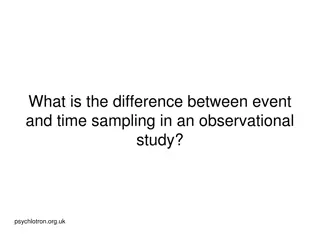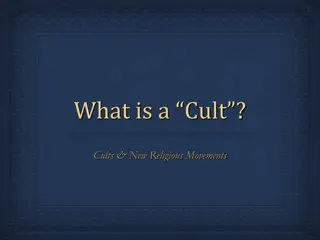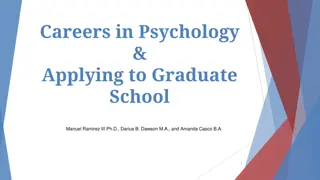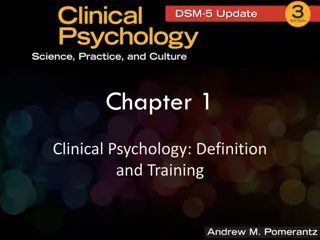Cults: Psychology Behind Famous Cults Throughout History
Cults have intrigued and shocked society for decades. Learn about the psychology behind infamous cults like the Manson Family and People's Temple. Discover what defines a cult and its impact on followers. Join the discussion on the manifestations of cults and the influence of leaders. Follow the Forensic Psychology Club for more insights.
Download Presentation

Please find below an Image/Link to download the presentation.
The content on the website is provided AS IS for your information and personal use only. It may not be sold, licensed, or shared on other websites without obtaining consent from the author. Download presentation by click this link. If you encounter any issues during the download, it is possible that the publisher has removed the file from their server.
E N D
Presentation Transcript
THE FORENSIC PSYCHOLOGY CLUB: THE FORENSIC PSYCHOLOGY CLUB: PSYCHOLOGY OF CULTS PSYCHOLOGY OF CULTS
Recap and Reminders Recap and Reminders Keep in mind that for every meeting you attend, you earn extra points to be entered into our end Keep in mind that for every meeting you attend, you earn extra points to be entered into our end- - of of- - the the- - semester raffle! semester raffle! If you haven t already, check out our February Newsletter If you haven t already, check out our February Newsletter We are now accepting applications for new board members for the fall of 2021 We are now accepting applications for new board members for the fall of 2021 We will be discussing the psychology behind cults today We will be discussing the psychology behind cults today Follow us on Social Media! Follow us on Social Media! Instagram: Instagram: @fsufpc @fsufpc Twitter: Twitter: @fsu_fpc @fsu_fpc Facebook: Facebook: FSU Forensic Psychology Club FSU Forensic Psychology Club Request to join our Request to join our Nole Nole Central page if you aren t already on the roster! Central page if you aren t already on the roster!
What defines a cult? What defines a cult? A cult is defined as a particular system of religious A cult is defined as a particular system of religious worship, especially with reference to rites and worship, especially with reference to rites and ceremonies ceremonies Involves great admiration for a person, ideal, or thing Involves great admiration for a person, ideal, or thing Manifested by a body of followers Manifested by a body of followers
Famous cults throughout history Famous cults throughout history The Manson Family The Manson Family Charles Manson spent his life in and out of prison Charles Manson spent his life in and out of prison Recruited young, impressionable rebels without a cause Recruited young, impressionable rebels without a cause We were just a bunch of kids looking for love and attention and a different way to live ~ Family member Catherine Share We were just a bunch of kids looking for love and attention and a different way to live ~ Family member Catherine Share Manson self Manson self- - identified as Jesus Christ and obsessed over what he believed were hidden messages about a race war in The Beatles identified as Jesus Christ and obsessed over what he believed were hidden messages about a race war in The Beatles White Album White Album Charlie was me and I was Charlie, and all of us were one at the ranch ~ Family member Susan Atkins Charlie was me and I was Charlie, and all of us were one at the ranch ~ Family member Susan Atkins People s Temple People s Temple Jim Jones was a minister in California who drew large, interracial crowds of poor people who felt left behind by society Jim Jones was a minister in California who drew large, interracial crowds of poor people who felt left behind by society Conducted miracle healings and preached about civil rights and equality Conducted miracle healings and preached about civil rights and equality Drew from Christianity, Buddhism, and Leninism Drew from Christianity, Buddhism, and Leninism Exploited racial fears and instilled group paranoia, offering the People s Temple as the only salvation Exploited racial fears and instilled group paranoia, offering the People s Temple as the only salvation Left the country with 1,000 of his members and settled in Jonestown in South America Left the country with 1,000 of his members and settled in Jonestown in South America Ordered his members to die with dignity by drinking poisoned fruit punch Ordered his members to die with dignity by drinking poisoned fruit punch Over 900 people, including more than 250 babies and children, died Over 900 people, including more than 250 babies and children, died
Characteristics of cults Characteristics of cults Dissent or doubt is discouraged, and sometimes punished Dissent or doubt is discouraged, and sometimes punished Leader dictates how members act, think, and feel Leader dictates how members act, think, and feel Elitist, polarized, us Elitist, polarized, us- - versus versus- - them mentality Leader is not held accountable to any authorities (they are the authority) Leader is not held accountable to any authorities (they are the authority) Most loyal followers believe life outside of the cult does not exist Most loyal followers believe life outside of the cult does not exist Leadership induces feelings of guilt and shame to influence and control members Leadership induces feelings of guilt and shame to influence and control members Mind Mind- - altering practices are used to suppress doubts altering practices are used to suppress doubts Drugs, sleep deprivation, mediation, etc. Drugs, sleep deprivation, mediation, etc. Overzealous commitment to leader, his beliefs, ideology and practices Overzealous commitment to leader, his beliefs, ideology and practices Ideology is regarded as the supreme truth and/ or law Ideology is regarded as the supreme truth and/ or law them mentality
Cults explained Cults explained You don t have to be a certain kind of person to succumb to a cult You don t have to be a certain kind of person to succumb to a cult Recruiters frequent bus stations, airports, campuses, libraries, rallies, etc. Recruiters frequent bus stations, airports, campuses, libraries, rallies, etc. Potential members are invited to attend special functions or classes, and eventually they keep this Potential members are invited to attend special functions or classes, and eventually they keep this member involved in group activities, meditation, obsessive praying, lecturing, preaching, or lack of member involved in group activities, meditation, obsessive praying, lecturing, preaching, or lack of sleep to keep the mind in a debilitated state sleep to keep the mind in a debilitated state Some people have had psychotic breaks during this initiation process Some people have had psychotic breaks during this initiation process Typically involves someone who is vulnerable and easily enticed by reward Typically involves someone who is vulnerable and easily enticed by reward Companionship, peace of mind, a place to stay, or implied sexual offerings Companionship, peace of mind, a place to stay, or implied sexual offerings
What does this mean? What does this mean? Cults follow techniques that fall under the umbrella term of brainwashing Cults follow techniques that fall under the umbrella term of brainwashing Most commonly, intelligent young people who grew up in sheltered environments are more at risk for cult Most commonly, intelligent young people who grew up in sheltered environments are more at risk for cult membership membership Many members also have a history of failing to achieve intimacy, blaming others for their failures, and Many members also have a history of failing to achieve intimacy, blaming others for their failures, and striving for perfectionism striving for perfectionism Not all cults are destructive Not all cults are destructive Many who join and remain in cults do so out of a sincere quest for religious connection Many who join and remain in cults do so out of a sincere quest for religious connection Whether a cult is destructive is determined by the morality of the cult leader Whether a cult is destructive is determined by the morality of the cult leader Common negative characteristics of cult members: Common negative characteristics of cult members: Depression, guilt, fear, paranoia, slow speech, rigidity of facial expression and body posture Depression, guilt, fear, paranoia, slow speech, rigidity of facial expression and body posture Indifference to physical appearance, passivity , and memory impairment Indifference to physical appearance, passivity , and memory impairment
Final Notes Final Notes This month s newsletter will be released by the end of next week This month s newsletter will be released by the end of next week Remember to submit your applications for open board positions to Remember to submit your applications for open board positions to fsu.fpc@gmail.com The application will be linked in our The application will be linked in our LinkTree We will be announcing the new board in our next meeting We will be announcing the new board in our next meeting Our next, and last, meeting of the semester will be on 4/8/2021 Our next, and last, meeting of the semester will be on 4/8/2021 fsu.fpc@gmail.com LinkTree, which can be found in our Instagram bio , which can be found in our Instagram bio
Are there any questions? Are there any questions?
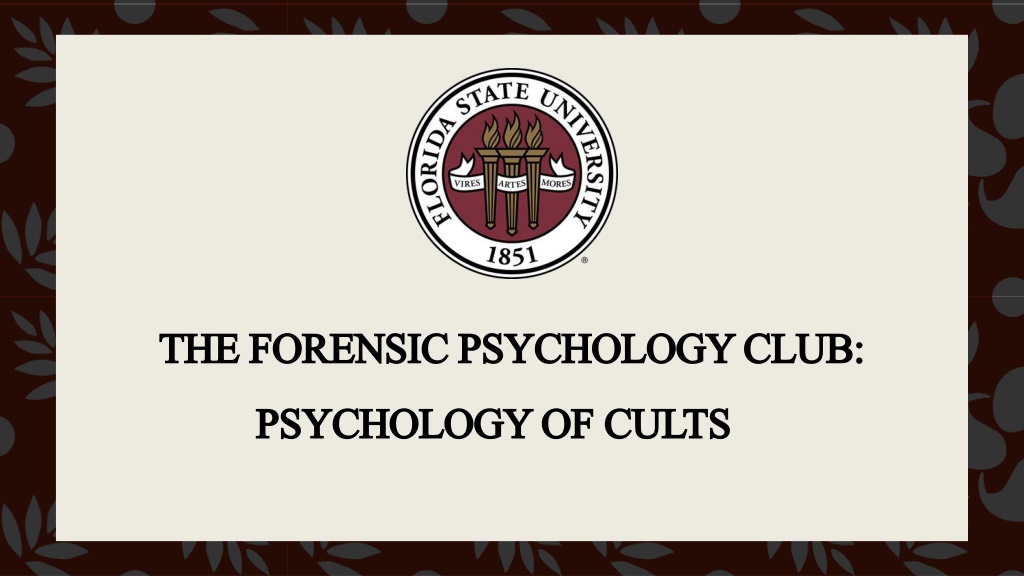
 undefined
undefined









